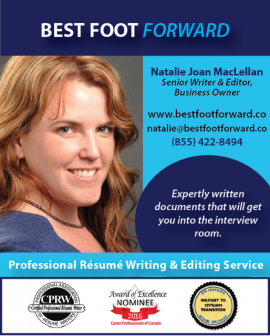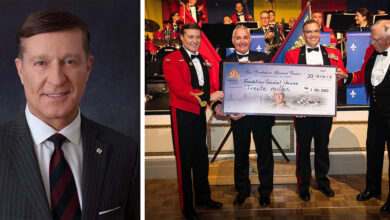Beyond The Uniform
Leaving the CF? Rethink Your Lingo!
By Audrey Prenzel CARW, CEIC, B.A., B.Ed
More than any other component of the civilian job search, this is the one that takes the most effort.
This is without question, one of the most difficult parts of the transition to Civvie Street, retooling your language. This may catch you off guard but I’d like to set the record straight right here. You will not have as much difficulty sharing the duties and achievements of your job as you will when you are speaking in general terms about being part of the CF. When push comes to shove, CF members can share the essence of what they were paid to do on a daily basis. It’s the other lingo you often throw around that you may not even be aware of, that is going to have to change. You’ll have to do it when you speak and when you write. As painful as it may be, let’s look at some key points to get you to start retraining your speaking pattern now.
 Internal CF memos, correspondence, reports and dialogue use abbreviations that outsiders will find difficult or impossible to interpret. Make it easy on them and don’t leave them guessing. Scrutinize your writing for any acronyms. Don’t get caught up in using the terms like CFSATE, or 2IC. Write and say them out completely. Using “Unit” to describe your area of accountability is better described as “Division”. Likewise, rephrase “Subordinates” as “Direct Reports”. I once had a client incensed that, at the time, I did not know what he meant by PT. When I want to know something I ask. Employers may to a point, or may not at all.
Internal CF memos, correspondence, reports and dialogue use abbreviations that outsiders will find difficult or impossible to interpret. Make it easy on them and don’t leave them guessing. Scrutinize your writing for any acronyms. Don’t get caught up in using the terms like CFSATE, or 2IC. Write and say them out completely. Using “Unit” to describe your area of accountability is better described as “Division”. Likewise, rephrase “Subordinates” as “Direct Reports”. I once had a client incensed that, at the time, I did not know what he meant by PT. When I want to know something I ask. Employers may to a point, or may not at all.
Sidestep telling time as 14:00. Say 2pm instead. Yes I know that airports and medical settings use the 24:000 dial, but the fact of the matter is that most civilian enterprises do not, so just bite the bullet and rethink
Sure you and I both know what an AVS TECH is or what an RMS CLERK does, but others have no notion of these strange looking, upper case letters. As painful as it may seem to you, take the time to spell them out when writing, or say them completely when speaking.
Let’s look at this in action. I had a client who bragged to me that he “dealt with ACAD this year”. After a bit of grilling, I learned that in actuality, he organized all of the logistics for the 25th annual Air Cadet Activity Day with 500 cadets and guests. See the difference in the impact? Specificity + Clarity = Impact
As far as speaking with hiring authorities, use their names exactly as they introduce themselves. If they say, “Hello, I am Mr. Smith and this is Mrs. Appleby” then call them by this. If they say they are Fred and Matilda, well then that is what you will call them.
Do not use “sir” or “ma’am”. I do hear this occasionally in the civilian world, but it is becoming quite dated. Most corporate customer service in-house training programs use the first name basis which is seen as more personal and makes it easier to resolve issues and complaints. I’ll be honest with you, if somebody calls me ma’am, I feel like an old lady. As a case in point, I always make a point of referring to myself as Audrey, and I invite others to do the same. It makes everybody more at ease.
Many currently serving CF Members are surprised to learn that the way they answer the phone while at work can pretty difficult to interpret. A common way of answering is to say your rank and name of course, along with some tidbits of pertinent sectional data. The problem is that you are used to a fellow CF Member calling you and not a potential employer, so it is usually blurted out at lightening speed. HR Managers I speak with have told me that they usually ask you to repeat whatever it was you just said. Tip, if you are anticipating a call at work, simply slow down when you answer the phone. Make it easy for somebody outside of the Base to understand what you are saying. If the caller ends up being one of your current colleagues, well, then it is no big deal. But during your phase of securing interviews, make the effort to avoid that all too common rapid fire “rank-name-section-good-day-sir-or-ma’am” which I often hear, along with prospective employers.
Audrey Prenzel, CARW, CEIC, B.A., B.Ed. is the founder of Résumé Resources. She is proud to be the career expert for www.hirecanadianmilitary.com. Audrey is the author of “Military to Civvie Street: The Complete Job Transition Guide for those Leaving the Canadian Air Force, Army & Navy”. She holds numerous roles with Career Directors International including Military Transition Expert Program Leader, Aerospace/Defence Program Leader, Mentor, Canadian Advisor, and Director of International Relations. Visit Audrey’s website www.resumeresources.ca









